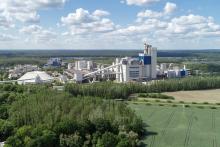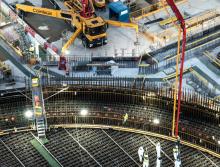
The companies say the move marks a decisive step in the race to ‘Net Zero’ concrete by 2050. The industry last year announced its ambition to fully decarbonise by 2050 and is now detailing its roadmap to achieve this goal.
The new pledge by the members of the Global Cement and Concrete Association (GCCA) is claimed to mark the biggest global commitment by an industry to net zero so far – bringing together companies from the Americas, Africa, Asia, including India and China, and Europe.
It follows the September announcement during New York Climate Week that the GCCA has become the first global ‘heavy’ industry accelerator for the UN’s global Race to Zero. GCCA members account for 80% of the global cement industry volume outside of China, and also include several large Chinese manufacturers.
The GCCA has published a detailed roadmap which sets out the path that the industry will follow to fully decarbonise by 2050, a target aligned with the Paris Agreement to limit global warming to 1.5°C. The GCCA says the roadmap actions between now and 2030 will prevent almost 5 billion tonnes of carbon from entering the atmosphere compared to a business-as-usual scenario, equivalent to the CO2 emissions of almost 15 billion passenger flights from Paris to New York.
Concrete is the most used human-made material on the planet with 14 billion m³ produced every year for use in everything from roads to bridges, tunnels to homes, and hydropower installations to flood defenses. Concrete is an essential element of construction, with no other material equalling its resilience, strength and wide availability. Production of cement, the key ingredient in concrete, accounts for around 7% of global CO2 emissions. The new 2030 commitment by the GCCA outlines a significant acceleration in the pace of industry decarbonisation.
The roadmap to get there is built around a seven-point plan that relies on ambitious yet achievable actions to reduce the amount of CO2 intensive clinker in cement, significantly reduce fossil fuel use in manufacturing, and accelerate innovation in products, process efficiency and breakthrough technologies including carbon capture.
Thomas Guillot, GCCA chief executive, said: “Global cooperation on decarbonising concrete is a necessity, as countries developing their infrastructure and housing will be the biggest users of concrete in the coming decades. I am proud of the commitment made by our members today to take decisive action and accelerate industry decarbonisation between now and 2030, an important milestone towards the ultimate goal of net zero concrete. I envision a world in the not too distant future where the foundation of a sustainable, zero carbon global economy will literally be built with green concrete."
Guillot added that the cement and concrete sector now needs governments around the world to work with it and use their huge procurement power to advocate for low carbon concrete in their infrastructure and housing needs.
"We require their support to change regulation that limits the use of recycled materials and impedes the transition to a low carbon and circular economy,” said Guillot.
The GCCA is calling on governments, designers and contractors to fully play their part by assembling the right public policies and investments to support the global scale transition of the industry. These include greater development of critical technologies such as carbon capture and storage, and reforms to public works procurement policy to encourage the use of low-carbon cement and concrete products. Public policy reforms and the promotion of low carbon products can make a big difference as public infrastructure accounts for almost 60% of all global cement and concrete demand.
Cao Jianglin, the CEO of China National Building Material Company (CNBM), said: “This is a landmark for industry co-operation in decarbonisation. As part of a global industry, it will need collaboration across our sector to achieve it. As one of the leading cement and concrete producers in China, we will play our part in decarbonising the industry.”
Fernando Gonzalez, CEO of CEMEX, commented: “The cement industry recognised climate change more than two decades ago, and was one of the first industries in the world to mobilize for sustainability and develop standards to report carbon emissions. With the GCCA’s issuance of the industry roadmap to arrive at net zero concrete by 2050, it continues demonstrating the industry’s leadership in climate action."









